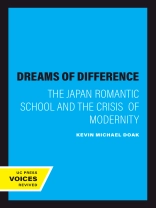From 1935 to 1945, the Japan Romantic School (Nihon Romanha), a group of major intellectuals and literary figures, explored issues concerning politics, literature, and nationalism in ways that still influence cultural discourse in Japan today. Kevin Doak’s timely study is a broad critique of modernity in early twentieth-century Japan. He uses close readings and translations of texts and poems to suggest that the school’s interest in romanticism stemmed from its attempt to surmount the 'cultural crisis’ of lost traditions. This attempt to overcome modernity eventually reduced the movement’s earlier critical impulses to expressions of nationalist longing.
From 1935 to 1945, the Japan Romantic School (Nihon Romanha), a group of major intellectuals and literary figures, explored issues concerning politics, literature, and nationalism in ways that still influence cultural discourse in Japan today. Kevin Doak’
Spis treści
Acknowledgments
Prologue: Nationalism, Romanticism, and the Problem of Modernity
1. Toward an Ironic Praxis: Yasuda Yojuro and the Aesthetics of Totality
2. Indeterminate Poetics: The Romantic Style
3. Return to Parnassus: The Exoticism of the Self
4. The Ethics of Identity: Kamei Katsuichiro and the Search for a New Subject
5. The Production of a Culture of the Same
Epilogue: Romanticism Rehabilitated
Appendixes
Notes
Bibliography
Index
O autorze
Kevin M. Doak is Associate Professor of East Asian Languages and Cultures and Associate Professor of History at the University of Illinois, Urbana-Chanpagne.












